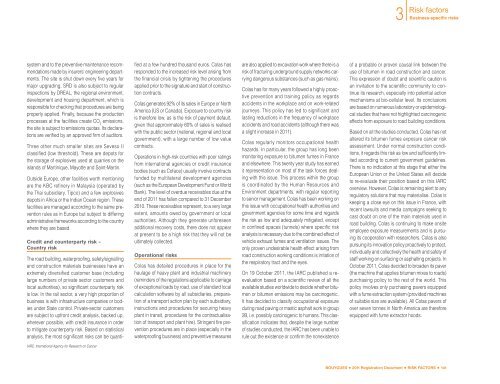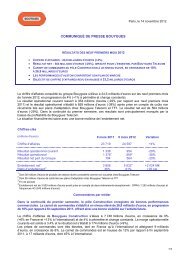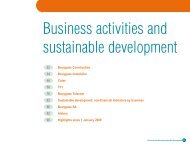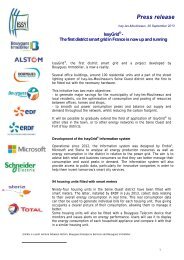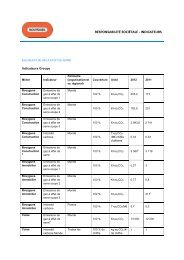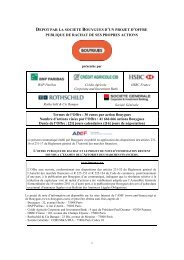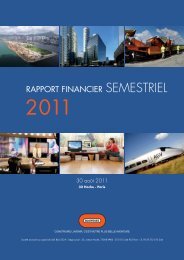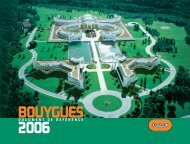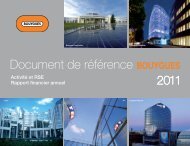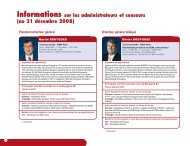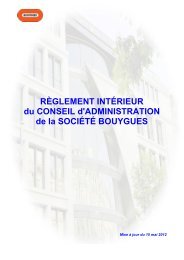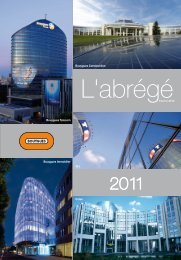Registration Document BOUYGUES
Registration Document BOUYGUES
Registration Document BOUYGUES
You also want an ePaper? Increase the reach of your titles
YUMPU automatically turns print PDFs into web optimized ePapers that Google loves.
3<br />
Risk factors<br />
Business-specific risks<br />
system and to the preventive maintenance recommendations<br />
made by insurers' engineering departments.<br />
The site is shut down every five years for<br />
major upgrading. SRD is also subject to regular<br />
inspections by DREAL, the regional environment,<br />
development and housing department, which is<br />
responsible for checking that procedures are being<br />
properly applied. Finally, because the production<br />
processes at the facilities create CO 2<br />
emissions,<br />
the site is subject to emissions quotas. Its declarations<br />
are verified by an approved firm of auditors.<br />
Three other much smaller sites are Seveso II<br />
classified (low threshold). These are depots for<br />
the storage of explosives used at quarries on the<br />
islands of Martinique, Mayotte and Saint-Martin.<br />
Outside Europe, other facilities worth mentioning<br />
are the KBC refinery in Malaysia (operated by<br />
the Thai subsidiary, Tipco) and a few explosives<br />
depots in Africa or the Indian Ocean region. These<br />
facilities are managed according to the same prevention<br />
rules as in Europe but subject to differing<br />
administrative frameworks according to the country<br />
where they are based.<br />
Credit and counterparty risk –<br />
Country risk<br />
The road building, waterproofing, safety/signalling<br />
and construction materials businesses have an<br />
extremely diversified customer base (including<br />
large numbers of private sector customers and<br />
local authorities), so significant counterparty risk<br />
is low. In the rail sector, a very high proportion of<br />
business is with infrastructure companies or bodies<br />
under State control. Private-sector customers<br />
are subject to upfront credit analysis, backed up,<br />
wherever possible, with credit insurance in order<br />
to mitigate counterparty risk. Based on statistical<br />
analysis, the most significant risks can be quantified<br />
at a few hundred thousand euros. Colas has<br />
responded to the increased risk level arising from<br />
the financial crisis by tightening the procedures<br />
applied prior to the signature and start of construction<br />
contracts.<br />
Colas generates 92% of its sales in Europe or North<br />
America (US or Canada). Exposure to country risk<br />
is therefore low, as is the risk of payment default,<br />
given that approximately 60% of sales is realised<br />
with the public sector (national, regional and local<br />
government), with a large number of low value<br />
contracts.<br />
Operations in high-risk countries with poor ratings<br />
from international agencies or credit insurance<br />
bodies (such as Coface) usually involve contracts<br />
funded by multilateral development agencies<br />
(such as the European Development Fund or World<br />
Bank). The level of overdue receivables due at the<br />
end of 2011 has fallen compared to 31 December<br />
2010. These receivables represent, to a very large<br />
extent, amounts owed by government or local<br />
authorities. Although they generate unforeseen<br />
additional recovery costs, there does not appear<br />
at present to be a high risk that they will not be<br />
ultimately collected.<br />
Operational risks<br />
Colas has detailed procedures in place for the<br />
haulage of heavy plant and industrial machinery<br />
(reminders of the regulations applicable to carriage<br />
of exceptional loads by road, use of standard local<br />
calculation software by all subsidiaries, preparation<br />
of a transport action plan by each subsidiary,<br />
instructions and procedures for securing heavy<br />
plant in transit, procedures for the contractualisation<br />
of transport and plant hire). Stringent fire prevention<br />
procedures are in place (especially in the<br />
waterproofing business) and preventive measures<br />
are also applied to excavation work where there is a<br />
risk of fracturing underground supply networks carrying<br />
dangerous substances (such as gas mains).<br />
Colas has for many years followed a highly proactive<br />
prevention and training policy as regards<br />
accidents in the workplace and on work-related<br />
journeys. This policy has led to significant and<br />
lasting reductions in the frequency of workplace<br />
accidents and road accidents (although there was<br />
a slight increase in 2011).<br />
Colas regularly monitors occupational health<br />
hazards. In particular, the group has long been<br />
monitoring exposure to bitumen fumes in France<br />
and elsewhere. This twenty year study has earned<br />
it representation on most of the task forces dealing<br />
with this issue. This process within the group<br />
is coordinated by the Human Resources and<br />
Environment departments, with regular reporting<br />
to senior management. Colas has been working on<br />
this issue with occupational health authorities and<br />
government agencies for some time and regards<br />
the risk as low and adequately mitigated, except<br />
in confined spaces (tunnels) where specific risk<br />
analysis is necessary due to the combined effect of<br />
vehicle exhaust fumes and ventilation issues. The<br />
only proven undesirable health effect arising from<br />
road construction working conditions is irritation of<br />
the respiratory tract and the eyes.<br />
On 19 October 2011, the IARC published a reevaluation<br />
based on a scientific review of all the<br />
available studies worldwide to decide whether bitumen<br />
or bitumen emissions may be carcinogenic.<br />
It has decided to classify occupational exposure<br />
during road paving or mastic asphalt work in group<br />
2B, i.e. possibly carcinogenic to humans. This classification<br />
indicates that, despite the large number<br />
of studies conducted, the IARC has been unable to<br />
rule out the existence or confirm the nonexistence<br />
of a probable or proven causal link between the<br />
use of bitumen in road construction and cancer.<br />
This expression of doubt and scientific caution is<br />
an invitation to the scientific community to continue<br />
its research, especially into potential action<br />
mechanisms at bio-cellular level. Its conclusions<br />
are based on numerous laboratory or epidemiological<br />
studies that have not highlighted carcinogenic<br />
effects from exposure to road building conditions.<br />
Based on all the studies conducted, Colas has not<br />
altered its bitumen fumes exposure cancer risk<br />
assessment. Under normal construction conditions,<br />
it regards this risk as low and sufficiently limited<br />
according to current government guidelines.<br />
There is no indication at this stage that either the<br />
European Union or the United States will decide<br />
to re-evaluate their position based on this IARC<br />
overview. However, Colas is remaining alert to any<br />
regulatory solutions that may materialise. Colas is<br />
keeping a close eye on this issue in France, with<br />
recent lawsuits and media campaigns seeking to<br />
cast doubt on one of the main materials used in<br />
road building. Colas is continuing to make onsite<br />
employee exposure measurements and is pursuing<br />
its cooperation with researchers. Colas is also<br />
pursuing its innovation policy proactively to protect,<br />
individually and collectively the health and safety of<br />
staff working on surfacing or asphalting projects. In<br />
October 2011, Colas decided to broaden its paver<br />
(the machine that applies bitumen mixes to roads)<br />
purchasing policy to the rest of the world. This<br />
policy involves only purchasing pavers equipped<br />
with a fume extraction system (provided machines<br />
of suitable size are available). All Colas pavers of<br />
over seven tonnes in North America are therefore<br />
equipped with fume extractor hoods.<br />
IARC: International Agency for Research on Cancer<br />
<strong>BOUYGUES</strong> • 2011 <strong>Registration</strong> <strong>Document</strong> • RISK FACTORS • 141


